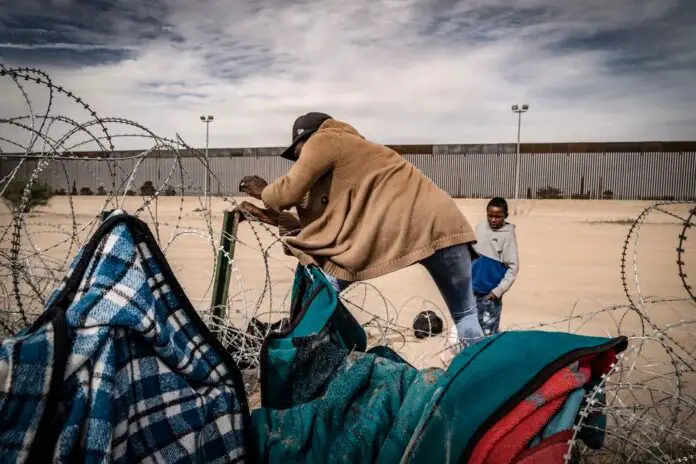The latest meetings between the United States and Mexico, in the middle of the Christmas break, to address the thorny issue of migration begin to serve some gestures. Mexico eases the flow to the northern border by dissolving the caravan of thousands of migrants that left Chiapas on December 24. The Government has now promised them a document that allows them legal stay in the country and has boarded them on buses to shelters on the border with Guatemala. Families and vulnerable groups with priority. But there has been no talk of humanitarian visas, as happened on other occasions. The United States responds with news that contribute to the calm in the Mexican part: the Biden Administration has urgently requested the Supreme Court that its federal agents can cut the barbed wire that the Republican governor of Texas ordered to prevent the entry of foreigners. And the most celebrated news by the Foreign Ministry has to do with the imminent opening of four border posts in California, Arizona and Texas. Goods will circulate again through the large border between the United States and Mexico, an economic concern that was also addressed in the recent meetings between the diplomatic delegations.
The continuous and increasingly numerous exoduses of foreigners are one of the greatest tensions between Mexico and the United States, which maintain, on the other hand, a huge commercial flow between their borders. The issue, in addition, heats up domestic politics between Republicans and Democrats months before the elections. Forced by this, the Biden Administration had asked the Government of Andrés Manuel López Obrador for greater efforts in containing migrants and the issue led to calls and diplomatic meetings that these days have their correlate in political actions. Irregular migration at the border has increased detentions by 35%, now crossings are counted by tens of thousands a week. The crisis needed, if not effective solutions, some political gestures, especially in electoral times.
If political disagreements harden measures against migration, agreements are also confusing for foreigners, who sometimes do not know what to expect. That has been the case of the promise of documents for the caravan of migrants who walked from Chiapas to the north in recent days. Some have chosen to accept those unspecified documents that the López Obrador Government offers them and have boarded the buses on their way to the shelters, confident of a legal stay in Mexico. Others have rejected the offer and will continue on foot enduring the hardships and extortions that mark the journey.
Four days ago, 30 migrants disappeared when they were traveling on a bus in Tamaulipas, one of the most dangerous states in Mexico, where foreigners are kidnapped by organized crime to serve their cause or released after receiving money in exchange. They have already been found. The Government assured that it was an “atypical” uprising due to the large number of people, but it is not the first time that this happens. Larger contingents were given on other occasions with a fatal ending.
The political troubles also occur within the United States, where the federal government and the state of Texas, governed by the controversial Republican Greg Abbott, are immersed in legal disputes to determine who is responsible for laying barbed wire or removing them. Abbott has spent more than $11 million on 70,000 rolls of concertinas. After several rulings and appeals, it is now the Supreme Court that must decide on the matter.
When migration crises worsen, however, walls and spikes take a back seat. The United States then closes the customs crossings where millions of dollars in goods cross every day and forces more intense negotiations. The trains are not only loaded inside, thousands of migrants climb on them to pass from one side to the other, which in turn has caused the railway cut by private companies in Mexico itself, where the news spoke of it and of the terrible accidents, some fatal, that impressed public opinion. The economy is usually negotiated quickly to avoid the millionaire losses that shake the employers and that has been the case in recent days.
The last meeting, held on December 27, resulted in the agreement to “intensify efforts to disrupt the trafficking of people, trafficking and criminal networks, and continue working to promote legal human mobility routes”. The United States agreed to open the doors to the merchandise and address the problem in the countries of origin, where they complain about the US blockades on their economies as one of the causes of the human exodus “unprecedented” that is experienced in these dates. It is not the only one, the political and freedom reasons are also an incentive to seek exile, as is the case of Nicaragua, Cuba or Venezuela, among others. In response to this, some actions aimed at stopping the transfer of migrants on their way to the United States will probably be seen in Mexico from now on in one way or another.
Source: El Pais







